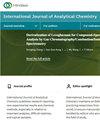利用火焰原子吸收光谱法测定椰枣果(Phoenix dactylifera)样品中的主要和痕量金属并评估相关的公共健康风险
IF 1.5
4区 化学
Q3 CHEMISTRY, ANALYTICAL
引用次数: 0
摘要
本研究旨在利用火焰原子吸收光谱法(FAAS)评估从埃塞俄比亚阿法尔、伊拉克和沙特阿拉伯等不同地区采集的椰枣果实样品中主要金属和痕量金属(Na、Ca、Fe、Zn、Ni、Mn、Cu、Cd 和 Pb)的浓度。样品处理采用了湿酸消解法,并对试剂体积比、烘箱温度和消解时间等关键参数进行了分析应用优化。在优化参数下,枣椰果样品中 Ca、Na、Fe、Ni、Zn、Mn 和 Cu 的平均金属浓度分别为 205-299、134-320、38.8-115、25.1-42.2、9.27-27.9、7.11-16.3 和 0.002-1.15 mg/kg。镉和铅的含量在线性范围内低于检测限。一般来说,与其他金属相比,枣椰树样本中的钙和钠含量较高,而铜和锰含量较低。Pearson 相关性分析表明,Fe 与 Na、Na 与 Zn、Na 与 Mn、Ca 与 Zn、Fe 与 Ni、Fe 与 Mn 以及 Mn 与 Ni 之间存在很强的正相关性。Ni与Na、Fe与Cu、Cu与Ni之间存在很强的负相关。Na 和 Cu、Ca 和 Fe、Ca 和 Ni、Ca 和 Mn、Ca 和 Cu、Fe 和 Zn、Ni 和 Zn、Zn 和 Mn 以及 Zn 和 Cu 之间的相关性较弱。采用加标法进行的回收研究表明,回收率在 91.6% 到 97.8% 之间,是可以接受的。健康风险评估包括慢性日摄入量(CDI)、危害商数(HQ)、总暴露危害指数(HI)和致癌风险(CR),结果表明,除镍的危害指数值外,CDI、HQ 和 HI 值均低于 1.0。这表明,这些金属可能不会对公众健康造成危害,而枣椰树样本中不含有镉和铅,也证实了食用枣椰树不会致癌。本文章由计算机程序翻译,如有差异,请以英文原文为准。
Determination of Major and Trace Metals in Date Palm Fruit (Phoenix dactylifera) Samples Using Flame Atomic Absorption Spectrometry and Assessment of the Associated Public Health Risks
This study aimed to assess the concentrations of major and trace metals (Na, Ca, Fe, Zn, Ni, Mn, Cu, Cd, and Pb) in date palm fruit samples collected from diverse regions, including Afar (Ethiopia), Iraq, and Saudi Arabia, utilizing flame atomic absorption spectrometry (FAAS). The wet acid digestion method was employed for sample treatment, with optimization of the key parameters such as reagent volume ratio, oven temperature, and digestion time for analytical applications. Under the optimized parameters, average metal concentrations in date palm fruit samples ranged from 205–299, 134–320, 38.8–115, 25.1–42.2, 9.27–27.9, 7.11–16.3, and 0.002–1.15 mg/kg for Ca, Na, Fe, Ni, Zn, Mn, and Cu, respectively. Cd and Pb levels were below detection limits within the linear range. Generally, date palm samples exhibited higher Ca and Na contents and lower concentrations of Cu and Mn than other metals. Pearson correlation analysis revealed very strong positive correlations between Fe and Na, Na and Zn, Na and Mn, Ca and Zn, Fe and Ni, Fe and Mn, and Mn and Ni. Strong negative correlations were observed for Ni and Na, Fe and Cu, and Cu and Ni. Weak correlations were noted among Na and Cu, Ca and Fe, Ca and Ni, Ca and Mn, Ca and Cu, Fe and Zn, Ni and Zn, Zn and Mn, and Zn and Cu. A recovery study using the spiking method demonstrated acceptable percentage recoveries ranging from 91.6% to 97.8%. Health risk assessment, including chronic daily intake (CDI), hazard quotient (HQ), total exposure hazard index (HI), and carcinogenic risk (CR), indicated CDI, HQ, and HI values below 1.0, except for the HI value for Ni. This suggests that the metals pose no probable public health risk, with the absence of Cd and Pb in date palm samples affirming no carcinogenic threats associated with their consumption.
求助全文
通过发布文献求助,成功后即可免费获取论文全文。
去求助
来源期刊

International Journal of Analytical Chemistry
CHEMISTRY, ANALYTICAL-
CiteScore
3.10
自引率
5.60%
发文量
117
期刊介绍:
International Journal of Analytical Chemistry publishes original research articles that report new experimental results and methods, especially in relation to important analytes, difficult matrices, and topical samples. Investigations may be fundamental, or else related to specific applications; examples being biological, environmental and food testing, and analysis in chemical synthesis and materials processing.
As well as original research, the International Journal of Analytical Chemistry also publishes focused review articles that examine the state of the art, identify emerging trends, and suggest future directions for developing fields.
 求助内容:
求助内容: 应助结果提醒方式:
应助结果提醒方式:


